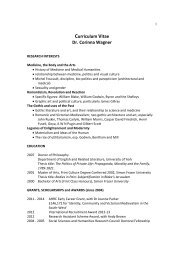'Cast out into the hellish night': Pagan Virtue and ... - Humanities
'Cast out into the hellish night': Pagan Virtue and ... - Humanities
'Cast out into the hellish night': Pagan Virtue and ... - Humanities
Create successful ePaper yourself
Turn your PDF publications into a flip-book with our unique Google optimized e-Paper software.
Philippa Byrne Ex Historia 52<br />
morality. 21 This paper considers two aspects of Lorenzo Valla’s thought on this complicated<br />
topic. Firstly, it asks whe<strong>the</strong>r Valla believed that worthy pagan heroes had merited a heavenly<br />
reward; secondly, it assesses <strong>the</strong> moral validity that Valla attached to classical literature.<br />
Underst<strong>and</strong>ing Valla’s answers to <strong>the</strong>se questions is naturally important for what it suggests<br />
ab<strong>out</strong> his own attitudes to Christianity, attitudes on which modern scholars have found it hard to<br />
agree. Moreover, it has broader implications for how we conceptualise <strong>the</strong> relationship between<br />
<strong>the</strong>ology <strong>and</strong> humanism in <strong>the</strong> quattrocento, <strong>and</strong> indeed for <strong>the</strong> uneasy alliance represented by<br />
<strong>the</strong> unfortunate term ‘Christian Humanism’ itself. Humanist <strong>the</strong>ology was bequea<strong>the</strong>d a set of<br />
problems by medieval scholasticism, problems which could not simply be dismissed along with<br />
barbarous scholastic Latin. 22 These are <strong>the</strong> problems with which Valla grapples in De voluptate.<br />
The Virtuous <strong>Pagan</strong><br />
At <strong>the</strong> opening of De voluptate, Valla undertakes to discuss virtue, noting that <strong>the</strong> subject of<br />
religion had been sufficiently explored by Lactantius <strong>and</strong> Augustine. Yet, having made this<br />
assertion, he begins to discuss <strong>the</strong> fate in <strong>the</strong> afterlife of those who lived before Christ. This may<br />
seem a non sequitur, yet it is an entirely logical move. Valla is dealing with <strong>the</strong> confused question<br />
of whe<strong>the</strong>r those who professed a now demonstrably ‘false’ religion might be saved by virtue of<br />
<strong>the</strong>ir moral goodness. He takes aim at a group he dubs <strong>the</strong> amatores gentilium, those who believe<br />
that ancient pagans might have achieved salvation:<br />
There are quite a few people <strong>and</strong> (even more shamefully) learned men, with whom I have<br />
often talked, who ask <strong>and</strong> inquire: why is it that many of <strong>the</strong> ancients…who ei<strong>the</strong>r did<br />
21 Steven Botterill, ‘The Trecento Commentaries on Dante’s Commedia’, in The Cambridge History of Literary<br />
Criticism, Volume 2: The Middle Ages, ed. by Alistair Minnis <strong>and</strong> Ian Johnson (Cambridge: Cambridge<br />
University Press, 2005), pp. 590-611.<br />
22 For example, Aquinas had offered a somewhat positive interpretation of voluptas in his Summa Theologica,<br />
1a 2ae 27, 1 (English Dominicans, VI, 319-20).









